Bluehost vs HostGator 2024: Exploring the Best Web Hosting and Domains Tools
Are you trying to decide between Bluehost and HostGator for your website hosting needs? The comparison of Bluehost vs HostGator is crucial in determining which hosting provider best suits your requirements.
In this comprehensive analysis, we’ll explore various factors to help you make an informed decision. From pricing and performance to features and user feedback, we’ll cover it all to guide you towards the perfect hosting solution for your website.
So, let’s dive into the comparison of Bluehost vs HostGator and find the ideal fit for your online endeavours.
Pricing and Plans: Bluehost vs HostGator
In the Bluehost vs HostGator showdown, both companies offer various plans catering to different needs and budgets. When it comes to selecting a hosting provider, understanding the pricing and plans is crucial for making an informed decision.
Bluehost:
Bluehost provides a straightforward pricing structure with shared hosting plans starting at $1.95 per month for the basic package.
This includes a free domain for the first year, 10 GB SSD storage, unmetered bandwidth, and a Professional Email – Free trial.
For those looking to expand, Bluehost offers Choice Plus, Online Store and Pro plans, which can host multiple websites, storage, and additional features like spam protection and domain privacy.
For users requiring more power and resources, Bluehost has VPS and dedicated hosting options. These plans come with enhanced performance, dedicated IP, and advanced features, but naturally, they come with a higher price tag.

HostGator:
HostGator, on the other hand, also presents a range of hosting plans.
The Hatchling plan starts at $3.75 per month and includes a free domain for the first year, unmetered bandwidth, and a free SSL certificate for the first year.
The Baby Plan and Business plans offer additional features such as unlimited domains and a dedicated IP.
HostGator’s cloud hosting plans focus on scalability, allowing users to easily upgrade resources as their website grows.
The company also provides VPS and dedicated hosting solutions for those with more demanding requirements.
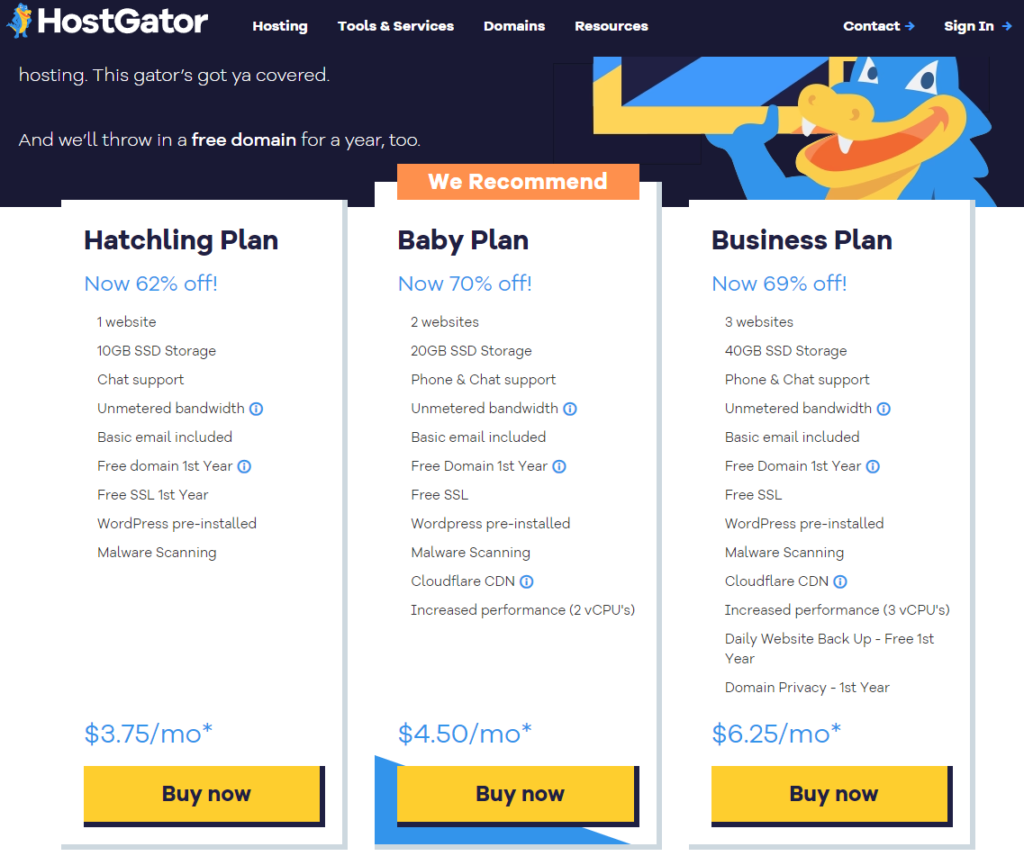
Comparison:
When comparing the pricing and plans of Bluehost vs HostGator, it’s essential to assess your specific needs and budget.
Bluehost’s basic shared hosting plan may seem more affordable initially, but HostGator’s offerings provide competitive features for a similar price point.
Consider factors like the number of websites you plan to host, the need for advanced features, and the scalability options each provider offers.
Performance and Uptime: Bluehost vs HostGator
Performance and uptime are crucial factors to consider when choosing a hosting provider, as they directly impact the accessibility and speed of your website.
Let’s delve into how Bluehost vs HostGator stack up in terms of performance and uptime reliability.
Bluehost:
Bluehost boasts impressive performance metrics, with an average response time of under 200 milliseconds and a 99.9% uptime guarantee.
The company leverages cutting-edge technology, including SSD storage, NGINX servers, and resource protection, to ensure optimal website performance even during traffic spikes.
Moreover, Bluehost’s partnership with Cloudflare provides users with access to a global content delivery network (CDN), enhancing website loading speeds for visitors worldwide.
This collaboration also includes DDoS protection, ensuring your site remains secure and accessible at all times.
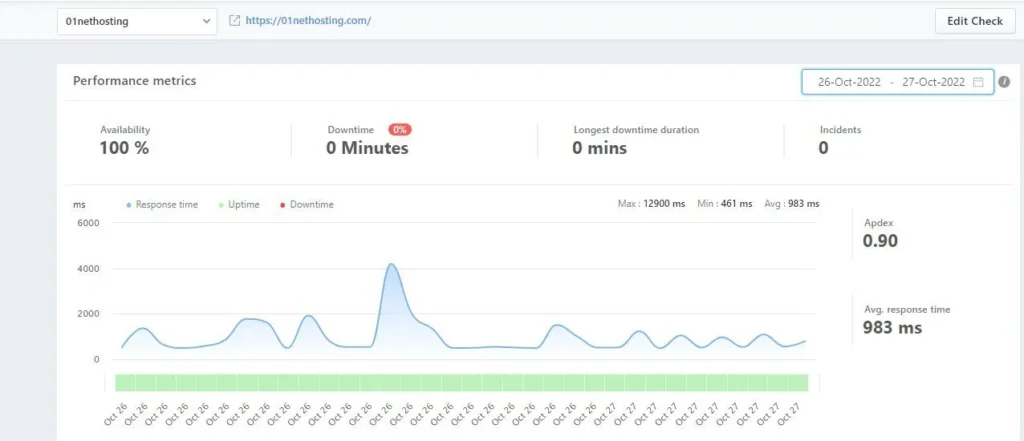
HostGator:
HostGator also prides itself on delivering reliable performance and uptime.
With a similar 99.9% uptime guarantee, HostGator utilizes state-of-the-art infrastructure and redundant network connections to minimize downtime and ensure consistent website availability.
The company’s use of mirrored storage ensures data redundancy, further enhancing uptime reliability by mitigating the risk of hardware failures.
Additionally, HostGator’s partnership with Cloudflare enables users to take advantage of its CDN and security features, similar to Bluehost.
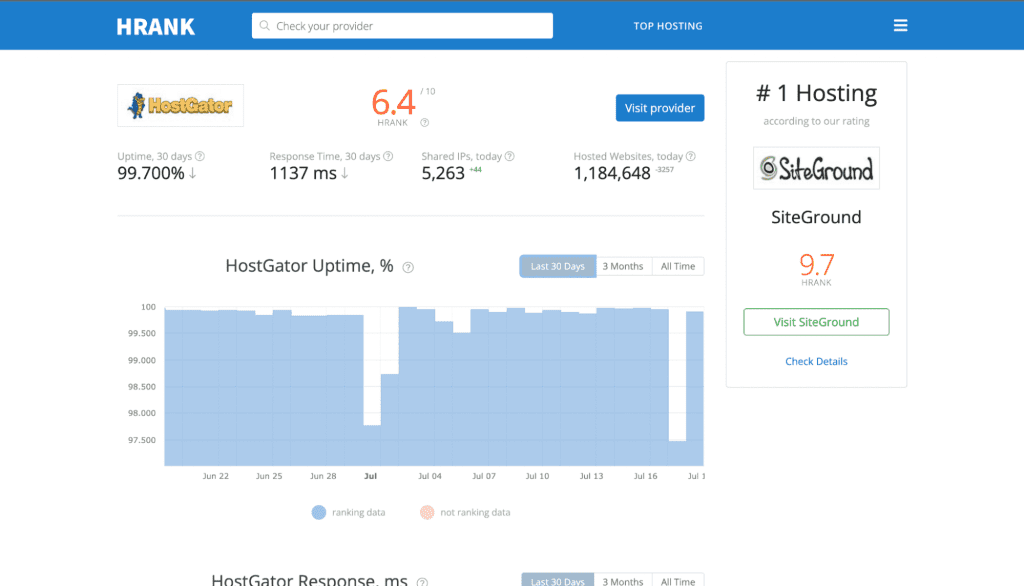
Comparison: Bluehost vs HostGator
When comparing the performance and uptime of Bluehost vs HostGator, both hosting providers offer robust infrastructure and uptime guarantees.
However, individual performance may vary depending on factors such as server location, website optimization, and traffic management.
It’s advisable to monitor performance metrics regularly using tools like Pingdom or GTmetrix to ensure your website meets your performance expectations.
Additionally, consider factors beyond uptime, such as server response times and page loading speeds, to gauge the overall user experience.
In conclusion, both Bluehost and HostGator prioritize performance and uptime reliability, making them suitable choices for hosting your website.
Ultimately, your decision should be based on your specific requirements and preferences regarding performance, features, and support.
Features: Bluehost vs HostGator
When comparing Bluehost vs HostGator, one of the key aspects to consider is the range of features each hosting provider offers.
Let’s delve into the features provided by both Bluehost and HostGator to help you make an informed decision.
Bluehost Features:
Bluehost boasts a comprehensive set of features tailored to meet the needs of various website owners. Here are some standout features:
- Free Domain Name: Bluehost offers a free domain name registration for the first year, making it convenient for users to get started with their online presence. (Image: Bluehost offering a free domain name)
- One-Click WordPress Installation: With Bluehost, installing WordPress is a breeze thanks to its one-click installation feature. This is particularly beneficial for users looking to set up a WordPress website quickly and efficiently. (Image: Bluehost’s one-click WordPress installation feature)
- Website Builder: Bluehost offers a user-friendly website builder tool that allows users to create stunning websites without any coding knowledge. The drag-and-drop interface makes it easy to customize layouts and design elements. (Image: Bluehost’s website builder tool)
- Unlimited Bandwidth: Bluehost provides unlimited bandwidth on all its hosting plans, ensuring that your website can handle high volumes of traffic without experiencing slowdowns or additional charges.
- SSD Storage: Solid-state drives (SSDs) are known for their superior speed and reliability compared to traditional hard disk drives (HDDs). Bluehost includes SSD storage across all its plans, resulting in faster website loading times and improved performance.
HostGator Features:
HostGator also offers a range of features designed to cater to the needs of website owners. Here are some notable features:
- Unmetered Disk Space and Bandwidth: HostGator provides unmetered disk space and bandwidth on all its hosting plans, allowing users to scale their websites without worrying about resource limitations.
- Free Website Transfer: If you’re switching to HostGator from another hosting provider, HostGator offers free website migration services to ensure a seamless transition.
- cPanel Control Panel: HostGator utilizes the popular cPanel control panel, which offers a user-friendly interface for managing your hosting account, domains, files, and more.
- Free SSL Certificate: HostGator includes a free SSL certificate with all its hosting plans, ensuring that your website data is encrypted and secure. (Image: HostGator’s free SSL certificate)
- 45-Day Money-Back Guarantee: HostGator stands behind its service with a generous 45-day money-back guarantee, giving users peace of mind when signing up for a hosting plan.
Ease of Use: Bluehost vs HostGator
When comparing Bluehost vs HostGator, one crucial factor to consider is the ease of use.
Both hosting providers aim to simplify the website management process for users, but there are differences in their approaches.
Bluehost:
Bluehost is renowned for its user-friendly interface, making it an excellent choice for beginners and experienced users alike.
The control panel, powered by cPanel, offers a straightforward layout with intuitive navigation. Users can easily access essential features such as domain management, file management, and email configuration.
Additionally, Bluehost provides one-click installations for popular CMS platforms like WordPress, Joomla, and Drupal, streamlining the website setup process.
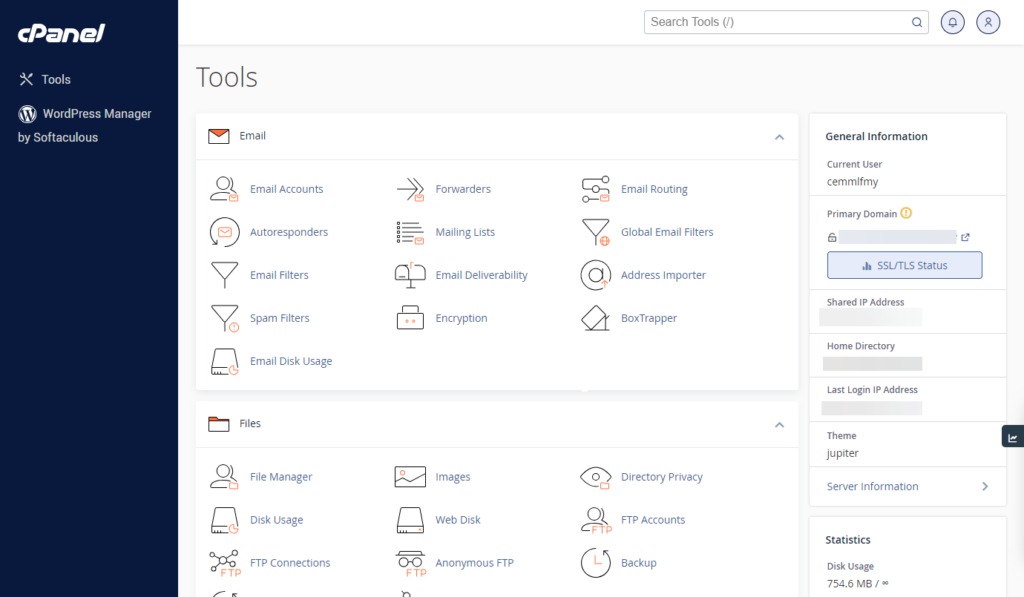
HostGator:
HostGator also prioritizes ease of use with its user-friendly control panel. While it doesn’t use cPanel like Bluehost, HostGator’s custom control panel is designed to be intuitive and accessible.
Users can manage their websites, domains, and email accounts efficiently through the control panel.
Like Bluehost, HostGator offers one-click installations for various CMS platforms, simplifying the process of launching a website.
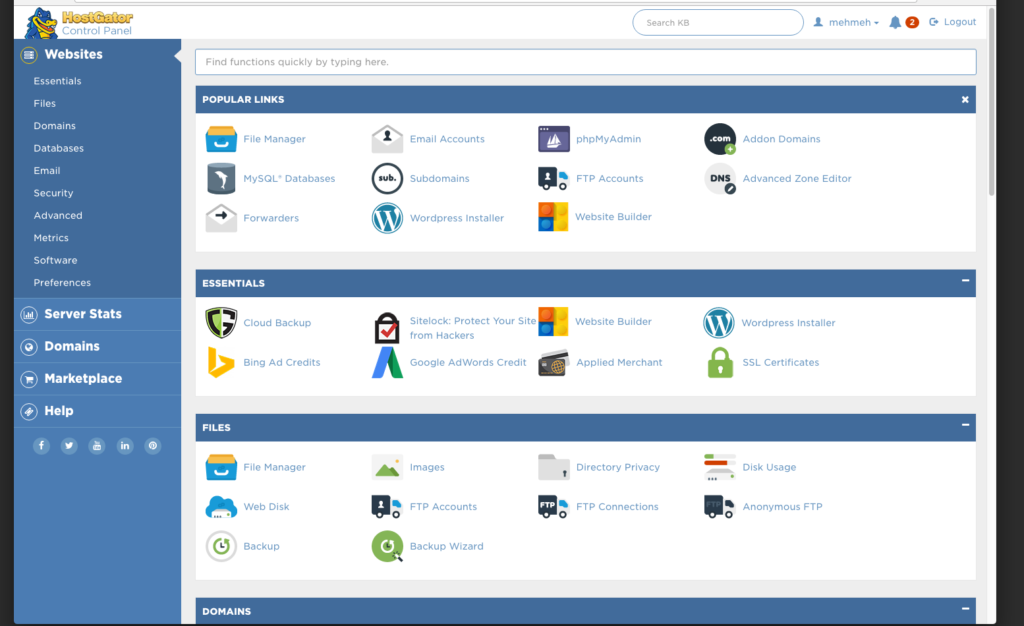
Customer Support: Bluehost vs HostGator
When it comes to web hosting, having reliable customer support can be a lifesaver, especially when you encounter technical issues or have urgent inquiries.
Let’s compare the customer support options provided by Bluehost and HostGator.
Both Bluehost and HostGator offer multiple channels for customer support, including live chat, phone support, and email ticketing systems.
This ensures that you can reach out to them through your preferred method, whether you prefer real-time assistance or asynchronous communication.
Live Chat Support:
Bluehost and HostGator both provide live chat support, allowing you to connect with a support agent instantly.
This feature is particularly useful for resolving urgent issues or getting quick answers to your questions. Screenshots of the live chat interface can be added here to give readers a visual idea of what to expect.
Phone Support:
Both hosting providers offer phone support for customers who prefer to speak directly with a support representative.
This can be beneficial for complex issues that require detailed explanations or troubleshooting steps. Consider adding an image of a phone icon next to the mention of phone support to make it visually appealing.
Email Ticketing System:
Bluehost and HostGator also have email ticketing systems in place, allowing you to submit queries or problems via email.
While this method may not offer instant responses like live chat or phone support, it provides a convenient way to track the progress of your inquiries and receive detailed solutions.
An image showing an email interface or a ticketing system dashboard could be inserted here to illustrate the process.
Response Times:
In terms of response times, both Bluehost and HostGator strive to address customer inquiries promptly.
However, response times may vary depending on the complexity of the issue and the current workload of the support team.
It’s essential to set realistic expectations regarding response times, especially during peak hours or holidays.
Overall Satisfaction:
User reviews and testimonials indicate that both Bluehost and HostGator generally receive positive feedback regarding their customer support services.
However, there may be occasional instances of mixed experiences, as with any service provider. Encourage readers to consider various factors, such as their specific needs and preferences, when evaluating customer support quality.
Conclusion:
In conclusion, both Bluehost and HostGator offer robust customer support options to assist users with their hosting needs.
Whether you prefer live chat, phone support, or email communication, you can rely on both providers to provide timely assistance.
Ultimately, the choice between Bluehost and HostGator may come down to other factors such as pricing, features, and performance.
Security: Bluehost vs HostGator
Bluehost Security Features
Bluehost offers a range of security features to keep your website safe from potential threats.
This includes free SSL certificates, which encrypt data transmitted between your website and its visitors, ensuring that sensitive information remains secure.
Additionally, Bluehost provides advanced security options such as SiteLock, which helps to prevent malware attacks and regularly scans for potential vulnerabilities.
With automatic backups and restoration options, Bluehost ensures that your website data is always protected and easily recoverable in case of emergencies.
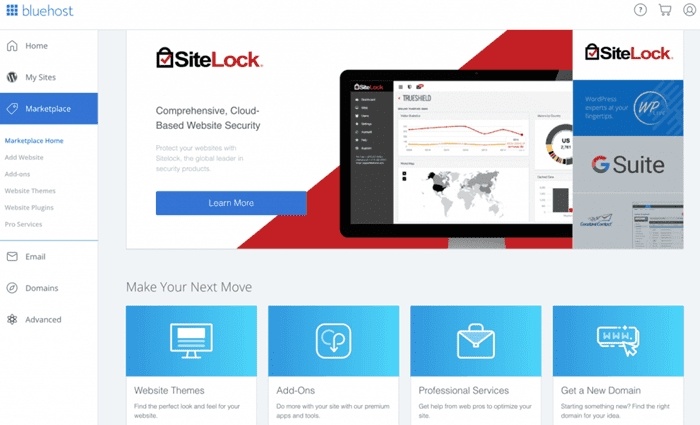
HostGator Security Measures
Similarly, HostGator emphasizes the importance of website security and provides robust measures to safeguard your online presence.
Like Bluehost, HostGator offers free SSL certificates to encrypt data and protect against unauthorized access.
HostGator also includes tools like CodeGuard, which automatically backs up your website and allows for easy restoration in the event of data loss or corruption.
Additionally, HostGator provides DDoS protection to mitigate the risk of distributed denial-of-service attacks, ensuring that your website remains accessible to legitimate users even during periods of heightened traffic.
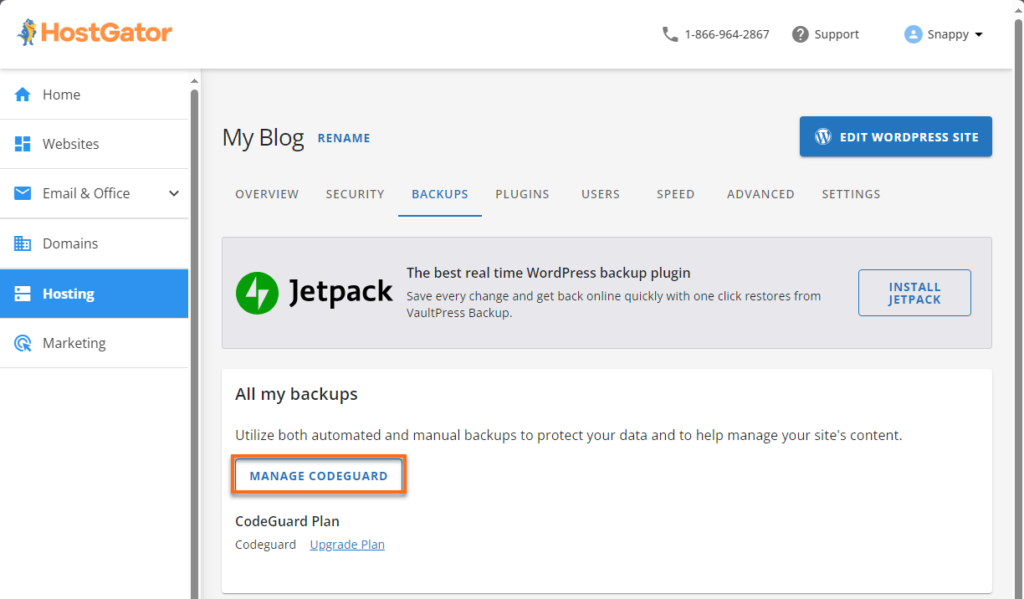
Scalability and Resources: Bluehost vs HostGator
Scalability and resources are crucial considerations when choosing a web hosting provider, especially if you anticipate growth or fluctuations in website traffic.
Let’s delve into how Bluehost and HostGator compare in terms of scalability and the resources they offer.
Bluehost: Bluehost provides scalable hosting solutions tailored to accommodate the evolving needs of websites.
With their plans, you have the flexibility to upgrade resources seamlessly as your website grows.
Whether you’re starting with a basic shared hosting plan or opting for more robust options like VPS or dedicated hosting, Bluehost ensures that you have the necessary resources to support your website’s performance.
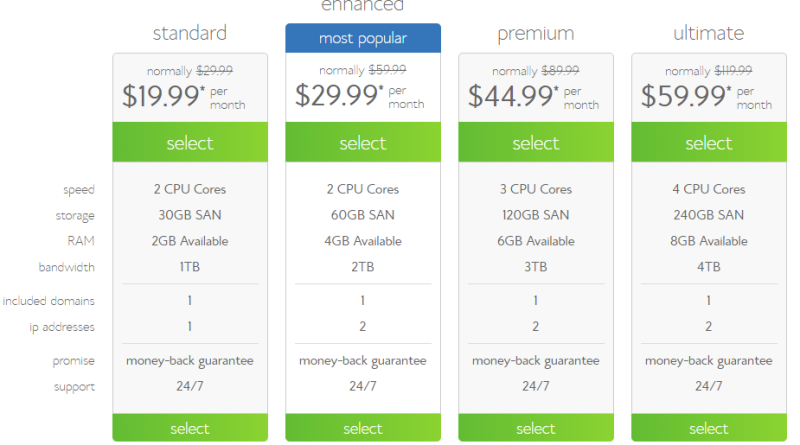
HostGator: Similarly, HostGator offers scalable hosting plans designed to cater to websites of all sizes.
You can begin with a shared hosting plan and easily scale up to more advanced options such as cloud hosting or dedicated servers as your website expands.
HostGator’s scalability features empower you to adapt to changing demands without compromising on performance or user experience.
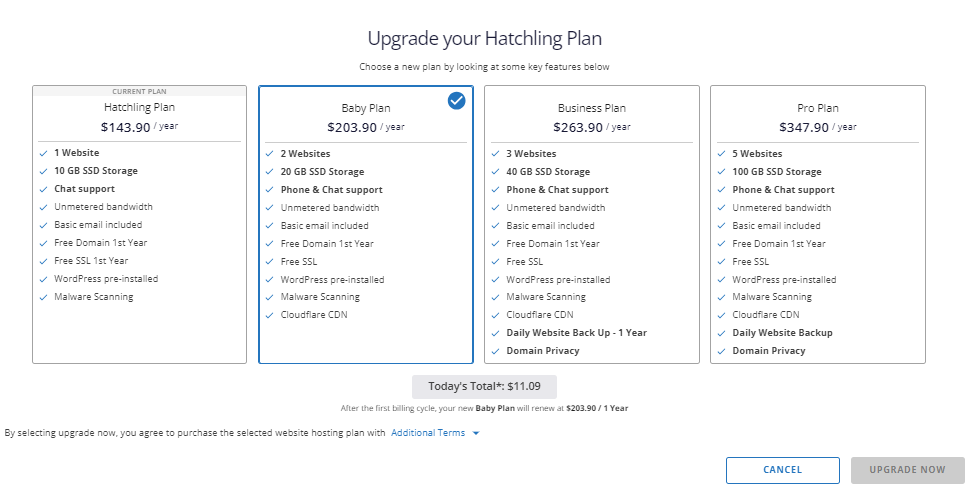
Comparison: Both Bluehost and HostGator excel in providing scalable hosting solutions, allowing you to upgrade resources effortlessly as your website evolves.
Whether you anticipate rapid growth or periodic spikes in traffic, both providers offer the flexibility to accommodate your needs.
Reviews and User Feedback: Bluehost vs HostGator
When considering between Bluehost and HostGator, it’s essential to delve into what users are saying about their experiences with these hosting providers.
Reviews and user feedback offer valuable insights into the real-world performance and satisfaction levels of customers.

Both Bluehost and HostGator have amassed numerous reviews across various platforms, including their own websites, forums, and independent review sites.
By aggregating and analysing this feedback, potential customers can gain a clearer understanding of what to expect from each service.
Users often highlight several key aspects when reviewing hosting providers. These include performance, reliability, customer support, ease of use, and value for money.
Examining these factors in the context of Bluehost vs. HostGator can help prospective users make informed decisions.
Conclusion: Bluehost vs HostGator
In the comparison between Bluehost and HostGator, both hosting providers offer compelling features and services tailored to various website needs.

However, after a comprehensive evaluation across pricing, performance, features, user-friendliness, customer support, security, scalability, and user feedback, one emerges as a slightly more favourable option based on your specific requirements.
Ultimately, the choice between Bluehost and HostGator depends on factors such as budget, technical expertise, website goals, and personal preferences.
Therefore, before making a decision, consider your priorities and carefully weigh the aspects discussed in this comparison. Whether you prioritize affordability, performance, or ease of use, both Bluehost and HostGator are reputable choices with strong track records in the hosting industry.
Remember, the best hosting provider is the one that aligns most closely with your unique needs and goals.
So, take the time to assess your requirements and make an informed choice that sets your website up for success.
Now, armed with the insights from this comparison, you’re ready to embark on your hosting journey confidently. Whether you choose Bluehost or HostGator, may your online endeavours flourish and thrive.
Happy hosting!
This post may contain affiliate links, and if you make a purchase through these links, I may earn a small commission at no extra cost to you. Your support helps me continue providing valuable content. Learn more in the Privacy Policy.

- Unveiling Skillshare: A Comprehensive Review for 2024
- NordVPN vs atlasVPN: Head-to-Head – Uncovering the Differences
- Unlocking the Potency of New Digital Marketing: Strategies, Tools, and Tips to consider
- Semrush vs Ahrefs vs Moz Pro – Cracking the Code 2024: A Detailed SEO Comparison
- Which are the 5 best Email Marketing tools: A Deep Dive into the Best Platforms for Success


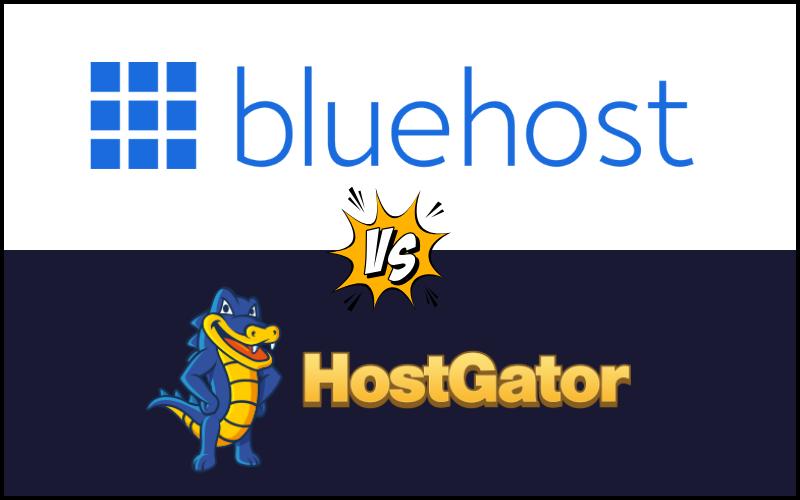



Pingback: Top 5 Email Marketing Tools: A Deep Dive into the Best Platforms - Review Craze Hub
Pingback: Semrush vs Ahrefs vs Moz Pro - Cracking the Code 2024: A Detailed SEO Comparison - Review Craze Hub
Pingback: Unveiling Skillshare: A Comprehensive 2024 Review
Pingback: Maximize Your Digital Marketing Potential